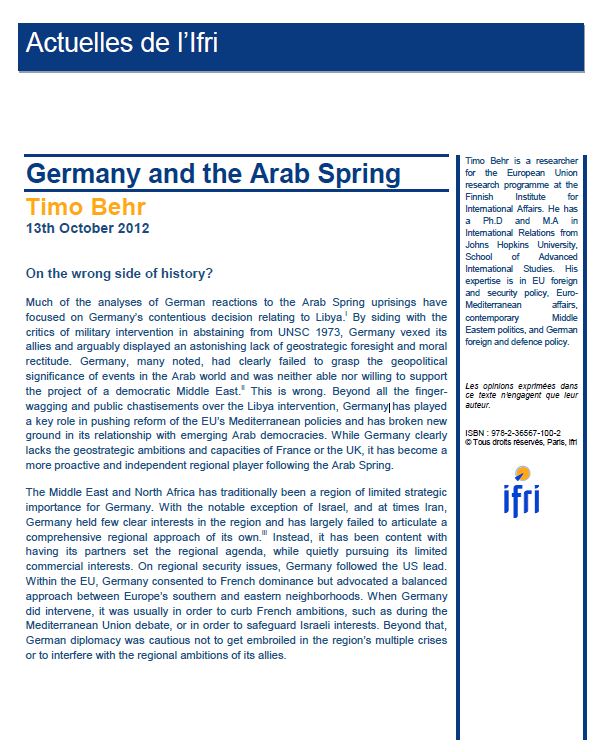Germany and the Arab Spring

Much of the analyses of German reactions to the Arab Spring uprisings have focused on Germany’s contentious decision relating to Libya. By siding with the critics of military intervention in abstaining from UNSC 1973, Germany vexed its allies and arguably displayed an astonishing lack of geostrategic foresight and moral rectitude.
Germany, many noted, had clearly failed to grasp the geopolitical significance of events in the Arab world and was neither able nor willing to support the project of a democratic Middle East. This is wrong. Beyond all the finger-wagging and public chastisements over the Libya intervention, Germany has played a key role in pushing reform of the EU’s Mediterranean policies and has broken new ground in its relationship with emerging Arab democracies. While Germany clearly lacks the geostrategic ambitions and capacities of France or the UK, it has become a more proactive and independent regional player following the Arab Spring.
The Middle East and North Africa has traditionally been a region of limited strategic importance for Germany. With the notable exception of Israel, and at times Iran, Germany held few clear interests in the region and has largely failed to articulate a comprehensive regional approach of its own. Instead, it has been content with having its partners set the regional agenda, while quietly pursuing its limited commercial interests. On regional security issues, Germany followed the US lead. Within the EU, Germany consented to French dominance but advocated a balanced approach between Europe’s southern and eastern neighborhoods. When Germany did intervene, it was usually in order to curb French ambitions, such as during the Mediterranean Union debate, or in order to safeguard Israeli interests. Beyond that, German diplomacy was cautious not to get embroiled in the region’s multiple crises or to interfere with the regional ambitions of its allies.

Available in:
Regions and themes
ISBN / ISSN
Share
Download the full analysis
This page contains only a summary of our work. If you would like to have access to all the information from our research on the subject, you can download the full version in PDF format.
Germany and the Arab Spring
Related centers and programs
Discover our other research centers and programsFind out more
Discover all our analysesOut of Thin Air but More than a Mirage: The Politics of Saudi Arabia's Nascent Music Industry
This study critically examines Saudi Arabia’s nascent music industry, which is promoted as a key element of Vision 2030, Crown Prince Mohammed bin Salman’s strategic framework to diversify the kingdom’s economy. It explores how state-led investments in music and entertainment intersect with authoritarian governance. The author neither dismisses these investments as conspicuous spending nor reproduces an alarmist narrative of impending cultural imperialism. The article takes a political sociology approach to understand how Saudi entertainment plans consolidate domestic power and reshape regional cultural landscapes.
Hostage diplomacy of the Islamic Republic of Iran. The case of Europeans detained in Iran
The so-called hostage diplomacy of the Islamic Republic of Iran refers to a political and diplomatic strategy in which Tehran uses the detention of Western nationals, dual citizens, or Iranian citizens residing in Europe, Australia, or the United States as leverage in diplomatic negotiations. This practice aims to exert pressure to secure political, economic, or diplomatic concessions as part of Tehran’s asymmetric response strategy. Hostage diplomacy remains a controversial yet effective tool from the perspective of the Islamic Republic of Iran, given its context of economic sanctions and diplomatic isolation.
Is the Republican People’s Party (CHP) Rising from the Ashes?
The victory of the CHP [Cumhuriyet Halk Partisi, Republican People’s Party] in the Turkish municipal elections of March 2024 firmly established it as the leading party of opposition to the Islamic-conservative AKP [Adalet ve Kalkınma Partisi, Justice and Development Party], which has been in power since 2002.
Israel-Palestine: One Solution, Two States
First proposed in 1936, the two-state solution has got lost over the course of several Israeli-Arab wars, colonization, the failure of the Oslo Accords, and the strategies of Israeli governments seeking rapprochement with certain Arab regimes. But it is currently the only imaginable solution. The numerous obstacles in its path could be overcome if the United States and its allies decided to impose it on the Israelis and Palestinians in opposition to their short-term visions.










